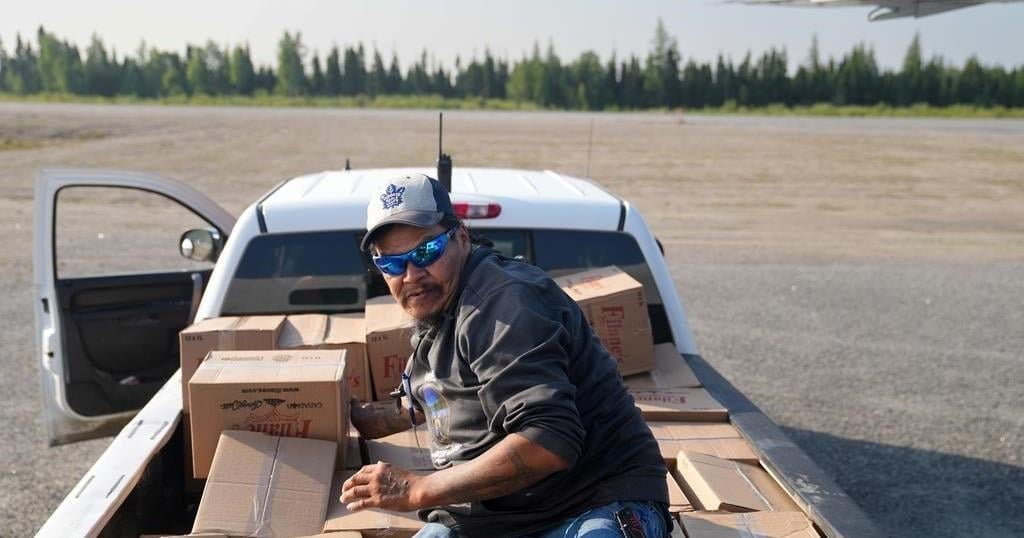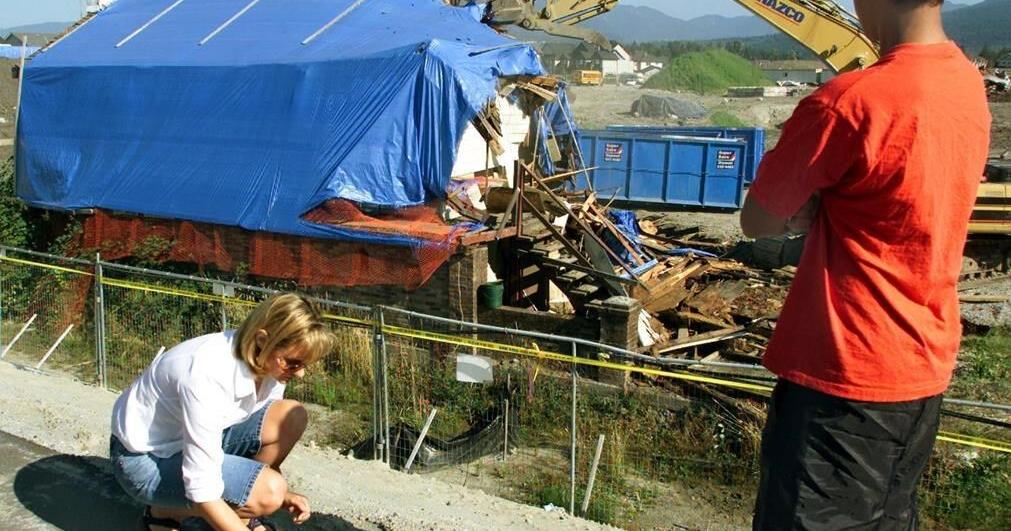NESKANTAGA FIRST NATION, ONT. – Every other day, Derek Moonias drives 15 minutes to the airport in Neskantaga First Nation and fills his pickup truck with cases of bottled water flown in on the dime of the federal government.
The community some 450 kilometres north of Thunder Bay, Ont. – accessible only by air and a winter ice road – has the longest boil-water advisory in the country at 29 years and growing. Many in the community have never lived at a time when the water coming out of the taps was declared suitable to drink.
On this morning, Moonias, the water distribution co-ordinator, is tired. A young mother called him overnight looking for clean water to make a bottle for her baby. He dug some up from his secret cache kept just for such occasions and rushed it over.
“It’s very sad, man,” he says. “It’s depressing.”
Moonias picks up about 95 cases a flight and serves 84 homes. In addition to that, half a planeload of clean water is needed for the community centre, the police and nursing stations, the band office and the school.
It’s nowhere near enough, he says.
After the airport, Moonias puts out a call to residents’ walkie-talkies that bottled water is available at the community centre. Residents soon converge to grab the cases as he keeps track of his clients.
“Water is my entire life right now,” he says as he wipes his brow and lets out a deep sigh. “The kids are my priority along with the Elders and medical clients.”
Moonias has plenty of first-hand experience with the effects of the local water supply. If he drinks from the tap, which he rarely does unless there’s no more bottled water, he gets nauseous. Headaches and diarrhea soon follow. Showers leave him itchy and scabs eventually break out. His diabetes leaves him slow to heal.
“There’s nothing like a good shower in Thunder Bay,” he says with a big grin. “Nothing worse than a bad shower here.”
The Canadian Press spoke to dozens of Neskantaga residents during a visit to the community in the summer of 2023. Water is, by far, their biggest worry and dominates every aspect of their lives.
“We’re supposed to be in one of the best countries in the world, but here we are living in poverty, living with a 29-year boil water advisory,” Chief Chris Moonias says in the community where many share the same last name.
“Canada isn’t what you believe it is.”
Life in Neskantaga comes with many challenges.
There’s a housing crisis – the First Nation has about 100 homes but needs at least double that to give its approximately 350 residents enough space to live comfortably. Currently, two-bedroom homes housing 10 or more people are common.
There’s no local high school, meaning children have to leave at 13 or 14 years old for further education. There is no doctor in the community and its nursing station faces constant staffing shortages. A state of emergency declared in 2013 over a rash of suicides remains in place. Opioids are an emerging worry, while alcohol still finds its way inside the dry reserve.
On top of all that, there is the water crisis.
PHYSICAL AND MENTAL HEALTH
Skin problems such as scabs, sores and eczema are common in Neskantaga, says Sharon Sakanee, the First Nation’s health director. Gastrointestinal issues are also common. Many residents refuse showers, or limit them.
“I shower less because the itchiness hangs around,” she says, explaining that her skin breaks out in patches of eczema.
“Whenever I leave and go to (Thunder Bay), I shower every day.”
Very few residents bother with boiling water because no one drinks from the tap. Instead, the community relies on bottled water and more and more people are relying on two reverse osmosis machines that clean the water coming from the problem-plagued treatment plant. But those machines can break down.
One machine in Neskantaga’s lone store broke down last summer and parts weren’t expected for weeks.
The water problem has also left many with mental health issues, including anxiety and a loss of trust.
“It’s stressful to families having to pick up water all the time,” Sakanee says. “Water is life, but when our water is always bad, life is hard.”
Maggie Sakanee had no running water for three years when she lived in a temporary spot while her own house was being fixed up. She trekked down to the osmosis machine on the shore every day for water.
She lives with her seven-year-old grandson, who is the priority for bottled water. But it takes about 15 jugs of the 1.5-litre water bottles to give him a bath.
“I’m always thinking about water, how to get it, when to get it, will it be enough, is it really safe,” she says. “It’s tiring.”
Her daughter, who now lives in Thunder Bay, refuses to drink the water from the taps even in that city.
Sakanee says she has lost trust in Neskantaga’s water.
“I don’t think I would ever drink water that came from a tap in Neskantaga,” she says. “It’s our way of life now.”
PARENTS UNDER STRESS
Twenty years ago, Ryan Moonias and his partner became parents. Bathing his baby boy was a challenge – they needed a water heater to warm up the small tub, which took hours, and his boy’s body consistently broke out in rashes.
“It was nasty,” he says. “You could tell the water was disgusting, it was yellow.”
The water problems, combined with a mouldy, crowded house forced his hand and the trio moved to Thunder Bay.
Two years ago, Moonias and his new partner, their seven-year-old son and their newborn, moved back to Neskantaga to be with family and friends. They wanted to return to the First Nation’s way of life, reconnect with the land and even the water. They knew the boil-water advisory remained, but felt they could handle it.
But the stress from the water problems became too much.
“You’re always thinking, ‘will the baby drink the water, what will happen if they do?” he says. “And when the kids get rashes, it’s awful.”
After 18 months, the family moved back to Thunder Bay, but it came at a cost.
“I miss my family, I miss my friends and I miss hunting and I miss Neskantaga,” Moonias says. “But this isn’t our home anymore.”
THE WATER TREATMENT PLANT
In the late 1980s, the entire community packed up from its original home on a low-lying peninsula named Landsdowne House with the promise of a better life on higher ground 15 kilometres west. Building a new water treatment plant, distribution system and homes with proper plumbing sprang hope for a better way of life.
Neskantaga’s water treatment plant became operational in 1993. But its sand filtration system was never able to produce water clean enough to drink. On Feb. 1, 1995, the community declared a boil-water advisory. That advisory remains in effect today.
In 2015, newly elected Prime Minister Justin Trudeau promised to end boil-water advisories in First Nations by 2021. The federal government says 145 boil-water advisories have been lifted since that pledge.
But those advisories still exist in 30 First Nations – 20 of them in Ontario and none as long as Neskantaga’s.
In 2017, the community, with financial support from the federal government, built a new filtration system for the water treatment plant, attaching a new building to the old one.
But problems persisted.
Just months after the new filtration system opened, Wilford Moonias noticed something strange. The former water plant operator saw an oily sheen in the holding tanks. Unsure what it was, the community declared a state of emergency and evacuated residents. Some 250 people lived in a Thunder Bay hotel for two months.
An investigation revealed a pump failure had caused mineral oil to seep into the water supply. Testing revealed high levels of hydrocarbons, says Moonias, who remains the community’s water distribution and sewage operator.
The Ontario Clean Water Agency now operates the plant on behalf of the First Nation. The company declined to comment.
On a warm summer day, Moonias details the water’s journey from Attawapiskat Lake through the treatment plant to the distribution pipes that run out of the building.
The water’s flow can be slow sometimes and other times is fine, he says. In basic terms, the lake water is cleaned as it wends through the plant. On this day, it pours clear into the plant’s reservoir. On other days, it is cloudy, Moonias says, because of high turbidity, which is a measure of particles in the water.
“The water is clean going into the reservoir,” Moonias says. “But here’s where trouble starts.”
He dips his hand into a massive tank, and when he slides it along the wall and pulls out, it’s covered in a green slime.
“This is a problem,” he says.
He next hops in his truck to show his “real concerns” – the water distribution system, the pipes that snake underground.
In some homes the water smells of chlorine, in others it comes out brown, and others have little pressure. In some homes the water is clear.
At one point, he points out a few fire hydrants near the plant.
“There’s very little pressure here, the hose won’t work,” he says. “Let’s hope there’s no fire down here.”
ELDERS AND THE ENVIRONMENT
Neskantaga sits on the shores of Attawapiskat Lake and River in the James Bay lowlands. The vast untouched area around the First Nation is flush with lakes and rivers. Water is everywhere.
The community’s dump lies a short drive away. Black bears, including several cubs, comb through the garbage as ravens chatter nearby. Empty plastic water bottles dot virtually every part of the site. Recycling is a challenge here.
“It’s difficult to look at,” Elder Alex Moonias says of the piles of empty bottles. “We are not meant to live like this.”
It’s hard for Elder Leo Moonias to look at the river as well.
“I look out onto the river, knowing I am supposed to drink to live, but I’m not allowed to drink that water or the water from the taps,” he says in Anishininiimowin, also called Oji-Cree.
Elders would like to be able to drink water from the lakes and rivers around them, but community testing shows it is often not safe to consume without treatment.
Moonias shakes his head as he looks at three boxes of water bottles delivered that day.
“You would not like it if you lived like this for close to 30 years,” he says.
THE FUTURE
On Feb. 1 this year – the 29th anniversary of the initial boil-water advisory – Indigenous Services Minister Patty Hajdu announced the federal government had agreed the community needed a brand new water treatment plant. Ottawa committed to help design the new plant and improve the current one.
“Everyone in Canada should have access to safe and clean drinking water,” Jennifer Kozelj, Hajdu’s spokeswoman wrote in a statement.
“We are committed to getting to a place where the community can feel comfortable in deciding to lift the boil water advisory.”
The federal government recently introduced legislation called the First Nations Clean Water Act. If passed, it will establish minimum nationwide water standards and set principles for decision-making in an effort to ensure boil-water advisories become a relic of the past.
In Neskantaga, Chief Chris Moonias sighs at the always slow pace of progress when it comes to the water supply.
Residents have decided on a different location for the new water treatment plant. But there’s still no commitment to replacing the community’s pipes, a sore spot for the chief.
“I really don’t remember what it was like to have clean water,” the 54-year-old says. Then he bursts into a big belly laugh.
“Maybe I’ll be dead by the time we have clean water here. But I hope to live to see that day. We deserve clean water.”
This report by The Canadian Press was first published Sept. 26, 2024.

























